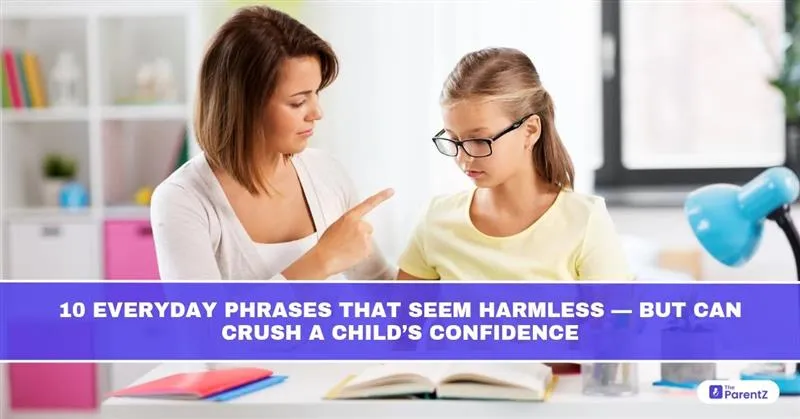The Power of Our Words
Children may forget what we bought them, but they rarely forget how we made them feel. And often, that feeling is shaped by our words, words spoken in frustration, jest, or habit, without any real intention to harm. Yet, these very words can settle into a child’s heart like tiny bruises, shaping how they see themselves and the world. In Indian households, especially, where discipline and love often walk a thin line, it’s easy to overlook the emotional impact of our tone, sarcasm, or comparisons.
1. “What’s wrong with you?”
Why it hurts:
This phrase, often said in anger, makes the child feel like they are defective rather than someone who made a mistake. It shames their identity rather than addressing their behavior.
Try instead:
“What happened? I want to understand.”
This opens the door for communication, not shame.
2. “Look at [so and so], learn something from them!”
Why it hurts:
Comparison is a deep wound in Indian parenting. Whether it’s siblings, neighbors, or cousins, being told they are “less than” someone else makes children feel inadequate and unloved for who they are.
Try instead:
“Let’s talk about your strengths. What do you want to improve?”
Focus on growth, not rivalry.
3. “Why can’t you ever listen?”
Why it hurts:
This phrase reinforces a negative label. The child internalizes that they are “bad at listening” and may stop trying altogether.
Try instead:
“I need your attention. Can you help me by focusing right now?”
Give a clear request with respect.
4. “You always mess things up.”
Why it hurts:
Words like “always” and “never” box a child into a fixed identity. It teaches them they are doomed to fail, so why even try?
Try instead:
“Everyone makes mistakes: what can we learn from this?”
Normalize failure and make space for learning.
5. “Don’t cry, it’s not a big deal.”
Why it hurts:
Dismissing emotions, especially in boys, teaches children that their feelings are invalid. Over time, they may suppress emotions, leading to anxiety or aggression.
Try instead:
“It’s okay to feel upset. I’m here with you.”
Validate feelings first, solve problems later.
6. “You’re such a lazy child.”
Why it hurts:
This labels the child rather than addressing the behavior. Children may start believing that motivation is not even expected of them.
Try instead:
“You seem tired or distracted. How can I help you get started?”
Empathize and offer support without name-calling.
7. “You’ll never succeed if you keep acting like this.”
Why it hurts:
Linking a mistake to a doomed future creates fear, not motivation. It creates anxiety around performance, which actually decreases learning.
Try instead:
“You’re capable of doing great things. Let’s figure out what’s getting in the way.”
Reinforce belief in their potential, not fear of failure.
8. “Big kids don’t behave like this.”
Why it hurts:
Shaming children for being “immature” teaches them to hide emotions rather than express them. It also sends the message that growing up means being emotionally numb.
Try instead:
“I know it’s hard. Growing up doesn’t mean you don’t need help.”
Affirm that emotions are part of being human at any age.
9. “Stop being so dramatic.”
Why it hurts:
When a child is overwhelmed, this phrase tells them that their reaction is exaggerated and unworthy of compassion. It discourages future expression.
Try instead:
“Tell me more about what you’re feeling. I’m listening.”
Even if the reaction seems big, it’s real to the child.
10. “I’m ashamed of you.”
Why it hurts:
This is one of the most damaging phrases a parent can say. It ties your love and approval to the child’s performance. It breaks the child’s belief that they are lovable no matter what.
Try instead:
“I didn’t like what happened, but I still love you. Let’s talk about it.”
Separate the behavior from their identity and reassure unconditional love.
Why These Phrases Are So Common And So Harmful
Many of us grew up hearing these same phrases, often from well-meaning parents who simply didn’t know better. In their generation, emotional awareness wasn’t even part of the conversation. So it’s natural to repeat what we heard.
But now we know better. Today, science and psychology both affirm that a child’s self-esteem, emotional regulation, and sense of safety are deeply shaped by how we speak to them in the earliest years of life.
What we say in a moment of anger can become their inner voice for years.
What You Can Do Differently, Starting Today
- Pause before reacting. Especially in anger, wait a few seconds before speaking. It can save a lifetime of regret.
- Speak to the behavior, not the child. Say “That wasn’t okay” instead of “You are bad.”
- Reframe correction with connection. Correct behavior after calming the emotion.
- Apologize when needed. A sincere “I’m sorry, I was harsh” teaches your child that everyone can grow including adults.
- Model kindness. Your tone becomes your child’s tone with themselves and others.
Final Thoughts: Words That Build, Not Break
As parents, our job is not to control our children, but to guide them. And guidance begins with respectful, conscious communication.
Yes, parenting is hard. Yes, there will be moments of frustration. But every word you speak is a chance to either tear down or build up your child’s self-worth. Choose carefully.
Let your words be the reason your child believes in themselves.
Let your voice become the safest sound in their world.
Remember:
Children don’t need perfect parents.
They need present, aware, and healing parents.
You have the power to break the cycle.
One word, one phrase, one day at a time.





Be the first one to comment on this story.